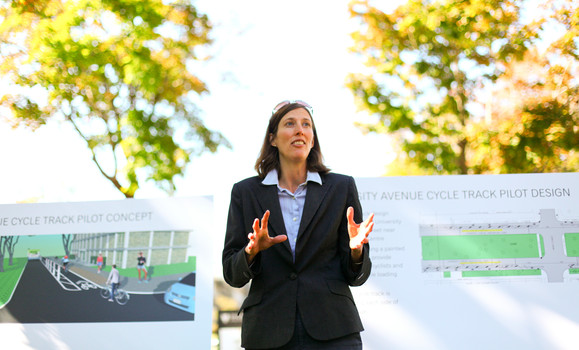The theme for Dalhousie’s first annual Cycling Forum was connectivity, and with the right support, that’s exactly what’s in store for cyclists in Halifax.
Cyclists, stakeholders and students gathered last Saturday for a half-day event to discuss visions, successes, priorities and how to move forward in making Halifax a first-class cycling environment.
The event featured an unveiling of the University Avenue Cycle Track plan outside the Killam Library, lunch with the Executive Director of Cycle Toronto Jared Kolb, a Dalhousie cycling presentation and a focus group session titled “A Vision for Cycling Connectivity at Dalhousie” in the Student Union Building. Attendees were also treated to a demo of the proposed cycle track following its reveal, as well as a lesson on how to do their own bike tune-ups.
Hanita Koblents, Halifax’s transportation demand management coordinator, began the presentations by introducing the attendees to the new HRM Bike Plan. Highlights of the plan include constructing streets and intersections that are safer for cyclists, increasing the number of protected bike lanes and creating a network of bike trails by connecting AT Greenways and multipurpose trails. “It’s challenging and slow, but we’re moving in a positive direction and we do have support from the mayor so it’s very exciting,” she said.
The plan also places a continuing focus on existing projects such as the Bike HRM Map; increasing bike parking; facilitating safety, education and skills training programs; and monitoring of collisions and impacts. Koblents noted that while bike street projects are normally associated with green initiatives, they can also be connected to improving overall quality of life in neighbourhoods.
Building a cycling community
“The goal is to demonstrate a new level of priority for cycling in transportation,” said Mark Nener, a community planner with the Cities and Environment Unit and faculty member of Architecture at Dal. “The momentum is growing, but the opportunity to increase the number of cyclists in the HRM is still huge.”
Nener and colleague Ross Soward led the second presentation which focused on the how Dalhousie students and faculty members have contributed to the ever-growing cycling culture. In 2012, Dalhousie worked with city planners to develop the Urban Halifax Institutional District Bikeways Plan, designed to promote cycling as an alternate mode of transportation and attract new riders of all ages.
“We need to build a cohesive network,” Nener said. “Not just the physical [network], but also relationships and partnerships to enhance the cycling experience for everyone.”

Rochelle Owen, Dal's director of sustainability, discusses the new cycling track planned for University Avenue.
Across Dal’s four campuses, the university boasts over 900 parking spaces for bikes, along with the Dal Bike Centre — which offers free bike loans, tools and cycling education — and programs such as DalTRAC, Share the Road Campaign, GIS active transportation mapping and bike parking inventory. At the beginning of September, Dal received funding for the first protected bike lane in Halifax and is currently piloting Halifax’s first bike box on Sexton Campus, designed to make intersections safer for cyclists.
Nener also spoke about a section of the Campus Master Plan which hopes to transform University Avenue/Morris Street into a high functioning bike corridor through campus to cater to the high number of staff and students who are within eight kilometres of the university.
“Here we are two years later, and I have to admit that I’m still surprised we received funding for the protected bike lane,” he said. “It’s an example of how Dal and other partners can help to advance cycling in Halifax.”

